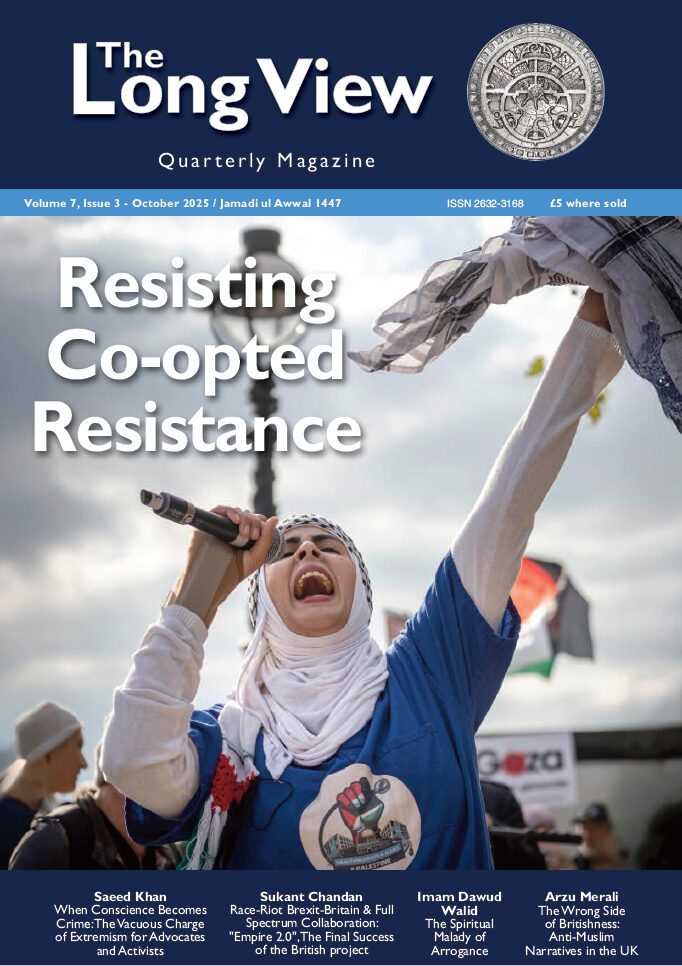Resisting Co-opted Resistance
Volume 7 – Issue 3 – October 2025 / Jamadi ul Awwal 1447
Essays
Editorial
Taking a moral stand against abusive power is invariably an invidious and onerous task. History is replete with the epitaphs of men and women whose consciences were shaken by the suffering of their people, moving them to act against injustice. These heroes and heroines risked their safety, freedom and even their lives to challenge the powerful of their age, seeking to ameliorate the plight of the oppressed.
The precarious lull in the genocide in Gaza that is being touted by its perpetrators and accomplices as some kind of epic peace deal should once again focus our attention on the huge sacrifices that have and continue to be made in defence of the Palestinian people and their right to the sacred land from which their occupiers seek to evict them. The death toll of 70,000 underlines how those in the centre have paid an unimaginable price for their steadfastness, something brought into stark relief by the hundreds of Palestinian political prisoners currently being released after spending decades in captivity.
In the periphery too, the personal cost of resisting the bestial march of brute colonial power has been immense. Ordinary people who have stepped up to implement international law in respect of genocide prevention in lieu of their governments’ failure or worse still, complicity, have been incarcerated with some even facing the prospect of deportation.
In the UK, the proscription of Palestine Action and the prosecution of its supporters and activists speaks to the extremes to which the state, unrestrained by ethical considerations, can go to preserve its interests. Our lead essay in this issue by Saeed Khan, looks at how governments have historically sought to flip the script and throw back the charge of extremism onto their adversaries. But the term has become so elastic and misused that like the allegation of anti-Semitism, it has lost its value. Though the tools that the modern state possesses to manufacture consent are innumerable and powerful, branding as extremists those who are exercising their conscience and moral duty in calling out a genocide only serves to debase the institution of government and exalt the victims. And even if that process isn’t contemporaneous, history is its own judge. Yesterday’s villains can easily become today’s heroes and their sacrifices an even bigger inspiration in posterity.
Our second essay by Sukant Chandan takes as its starting point the current defacing of British streets with the Union Jack (the British national flag) and St George’s Cross (the English national flag). Sukant departs from the standard narrative that it is the latest instalment in a culture war led by the far right. For him, the offensive against non-white migrants and the descendants of more recent migrant stock, is a state led initiative with precedents in modern history.
“For those of who know the histories of racism in Britain in the post-Second World War period, we remember well that the British Union Jack and English St George’s Cross flags are symbols of aggressive and violent provocative colonialism and racism on British streets and against us and our families, but also represent and are leading symbols in greater levels of violence on the streets of Ireland, South Africa, Aden and Kenya amongst other places,” says Chandan.
To make its racist project more palatable the state often recruits racialised people as a shield against accusations of racism. Never has this been truer in Britain than now with people of colour occupying some of the highest seats in government and in major political parties.
But another, no less important, strategy, according to Chandan, is to entice them into state-led cultural categories of ‘British Asian’ and ‘Black British’, “a ‘new’ kind of non-white Britishness that is presented in such a way that it directly appears to give a ‘sense of belonging and home’ for non-white people”. This status, subordinate to whites but superior to (neo)colonised people of colour, is necessary for separating people of colour from their native communities (at home and abroad) and passively or actively participating in colonial violence against them.
We cannot understand colonial violence without understanding the racism that underpins it. Our third piece, an extract from Imam Dawud Walid’s latest book, Islamic Metaphysics of Racism entitled locates the origins of racism in the same haughtiness that motivated Satan to refuse Allah’s order to prostrate to Adam upon his creation. In essence, racism is a spiritual shortcoming that no amount of legislation and delegitimization can eliminate from society (something painfully evident in its powerful reappearance in western societies despite decades of anti-racism efforts).
Our final instalment in this issue is a timely return to the dominant manifestation of racism in much of the world today: Islamophobia. Certainly, Islamophobia is the most prevalent iteration of racism in the UK. Research by Arzu Merali for the Islamic Human Rights Commission into the nature and prevalence of Islamophobia in Britain as part of an EU wide project in 2018 identified 10 main narratives. These can be subsumed under four main categories: Muslims as a security threat, Muslims as disloyal, Islam as incompatible with British values and Muslims as segregationist. All of these are in evidence in today’s resurgence of racism. The narratives serve to otherise Muslims, placing them outside the mainstream and inside an exclusion zone where they can be legitimately mistreated and discriminated against.
Revisiting these narratives, having now witnessed a genocide of scale against the Palestinians, highlights the warnings contained therein, that otherisation can and does lead to mass violence against the demonised. All of the pieces in this issue speak to the need for justice loving people world-wide to continue their demands for true liberation: for the Palestinians, and for the oppressed everywhere – whether they realise that is what they are, or not.

